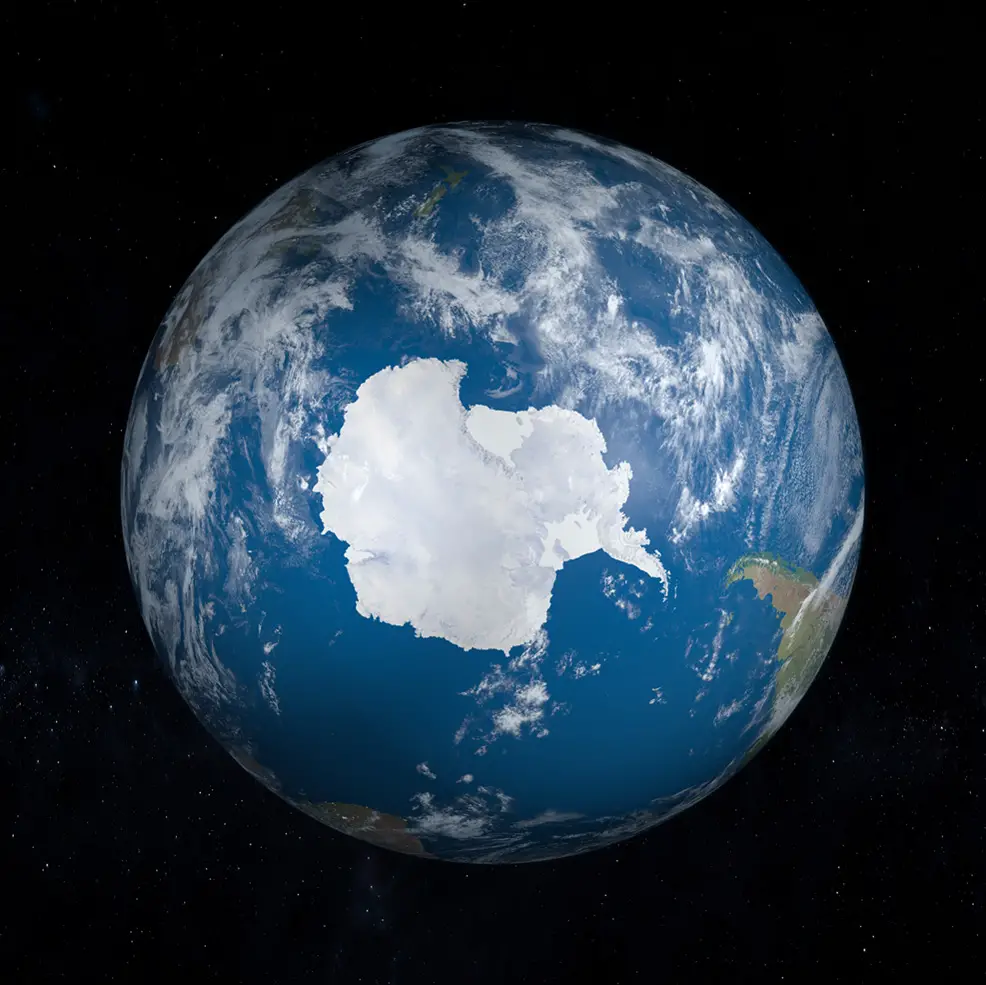
5th April 2023 Antarctic ocean heading for "collapse" by 2050 A study of the deep ocean currents around Antarctica finds they could slow by 40% by 2050, with significant implications for the global climate.
The deep ocean circulation that forms around Antarctica could be headed for collapse, say scientists. Such a decline would stagnate the bottom of the oceans and affect climate and marine ecosystems for centuries to come. A study exploring this scenario is published in the peer-reviewed journal Nature. Cold water that sinks near Antarctica drives the deepest flow of the overturning circulation – a network of currents that spans the world's oceans. The overturning carries heat, carbon, oxygen, and nutrients around the globe. This influences climate, sea level, and the productivity of marine ecosystems. "Our modelling shows that if global carbon emissions continue at the current rate, Antarctic overturning will slow by more than 40% in the next 30 years, and on a trajectory that looks headed towards collapse," says Prof Matthew England, Deputy Director of the ARC Centre for Excellence in Antarctic Science (ACEAS) at the University of New South Wales (UNSW). Each year, about 250 trillion tonnes of cold, salty, oxygen-rich water sinks near Antarctica. This water then spreads northwards and carries oxygen into the deep Indian, Pacific and Atlantic Oceans. "If the oceans had lungs, this would be one of them," says Prof England.
Professor England and his team modelled the amount of Antarctic deep water produced under the IPCC high emissions scenario. This new model captures details of ocean processes that previous models were unable to, including how meltwater from ice might influence the circulation. This deep ocean current has remained in a relatively stable state for millennia – but with soaring greenhouse gas emissions, Antarctic overturning is predicted to slow down significantly within just a few decades. In recent years, West Antarctica has seen unprecedented warming and ice loss. Although some parts of East Antarctica have gained volume (an argument often put forward by climate change deniers), this small increase in the east is nowhere near enough to compensate the huge losses on the other side of the continent. As the ice melts – at an ever-increasing rate – fresh water is poured from land into the ocean around Antarctica. This dilutes the salinity (salt content) of the sea and reduces its density, meaning it's no longer heavy enough to sink, pushing out the water that is already there. The conveyor belt, illustrated nicely in the animation above, begins to slow. Climate change deniers may dismiss this prediction as "just a computer model" – but the effect has already begun in the Arctic, where meltwater from Greenland is slowing the Arctic Meridional Overturning Current (AMOC) by 15% compared to the mid-20th century. This new study confirms that the same phenomenon is now underway in Antarctica and could lead to a slowdown as great as 42% by 2050.
With a collapse of this major ocean current, the waters below 4,000 metres are expected to stagnate. This will lead to rapid warming of the deep ocean and a reduction in nutrient upwells that feed phytoplankton – a foundation for the marine food chain. "This would trap nutrients in the deep ocean, reducing the nutrients available to support marine life near the ocean surface," explains Prof England. "Direct measurements confirm that warming of the deep ocean is indeed already underway," says co-author Dr Steve Rintoul, a physical oceanographer at CSIRO and the Australian Antarctic Program Partnership. "Our study shows that the melting of the ice sheets has a dramatic impact on the overturning circulation that regulates Earth's climate," says Dr Adele Morrison, also from ACEAS and the ANU Research School of Earth Sciences. "In the past, these circulations have taken more than 1,000 years or so to change, but this is happening over just a few decades. It's way faster than we thought these circulations could slow down," adds England. "We are talking about the possible long-term extinction of an iconic water mass. Such profound changes to the ocean's overturning of heat, freshwater, oxygen, carbon and nutrients will have a significant adverse impact on the oceans for centuries to come." "Final important point," he says in a Twitter thread. "Our projections were run under a 'business as usual' scenario. Deep and urgent emissions reductions will give us a chance of avoiding an ocean overturning collapse. But time is running out fast. And 2050 is just 26 years, 9 months and 2 days away."
Comments »
If you enjoyed this article, please consider sharing it:
|








